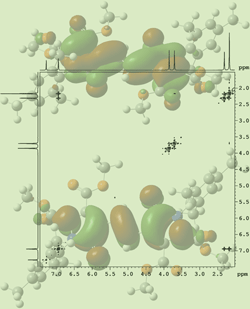issue contents
November 1999 issue

Cover illustration: trans-Tetrabromobis(3,5-dimethylpyridine)germanium(IV), a non-merohedral twin, see Hensen, Faber & Bolte, pages 1774-1775. Displacement ellipsoids are shown at the 50% probability level.
cif-access (inorganic compounds)
Download citation


Download citation


Single crystals of niobium heptaoxide chloride, Nb3O7Cl, have been prepared from a halide flux mixture. The structure consists of a three-dimensional network of distorted Nb octahedra coordinated by O and Cl atoms.
Download citation


Download citation


The title compound, barium disilver, was obtained as a by-product in the reaction of Ba, Ag and Bi mixed in a 2:4:3 molar ratio. This compound adopts the CeCu2 structure type. The shortest Ag—Ag distance is 2.8653(9)Å.
Download citation


Download citation


The structure of Na2Zn(OH)PO4 [Kabalov, Simonov & Belov (1972). Dokl. Akad. Nauk SSSR, 202, 823-826] has been redetermined and the hydrogen-bonding geometry elucidated. The tetrahedral ZnO4 and PO4 geometrical parameters are normal [dav(Zn—O) = 1.953 (17) Å and dav(P—O) = 1.54 (2) Å].
cif-access (metal-organic compounds)
Download citation


Download citation


The octahedral [TiCl4(dme)] complex (dme is 1,2-dimethoxyethane) has C2 molecular symmetry and is isostructural with its rhenium and molybdenum analogues.
Download citation


Download citation


The title compound, whose aqua ligand is exceedingly labile, crystallizes in a monoclinic form without a solvent molecule of crystallization. A recently observed triclinic form of this complex crystallized as a monohydrate. The Mn—O distance [2.102(3)Å] is consistent with the bond distance reported for the triclinic form [2.075(2)Å] and the related complex [(depe)(CO)3Mn(OH2)]BF4 [2.115(2)Å; depe is 1,2-bis(diethylphosphino)ethane].
Download citation


Download citation


The dihedral angles between the phenyl rings and the dionate chelate atoms of the associated six-membered manganese-containing rings are 19.03(15) and 21.08(13)°.
cif-access (organic compounds)
Download citation


Download citation


Both title compounds, 1,5-diphenylpentane-2,4-dione, (1), and 1,5-bis(2-naphthyl)pentane-2,4-dione, (2), exist in the enol form and have a planar enol ring with a short crystallographically symmetric hydrogen bond. In addition, the molecules possess twofold rotation symmetry so that the ketone and enol functionalities are completely delocalized.
Download citation


Download citation


The title compound adopts a chair–chair conformation in the solid state. It does not have effective mirror symmetry because the H atom of the hydroxy group lies markedly out of the mean plane of the central OC2PS unit.
Download citation


Download citation


In the title compound, the six-membered ring adopts a chair conformation and the five-membered ring an envelope conformation. The two crystallographically independent molecules are insignificantly different.
Download citation


Download citation


The title compound was found to exist solely as its ap rotamer in both the crystalline form and in solution, the exhibited structural distortions being reflected in the observed rotational hindrance. The more sterically restricted 9-(o-tert-butylphenyl)-9-fluorenol exists solely as its sp rotamer under these conditions.
Download citation


Download citation


The centrosymmetry of the title compound results in parallelism of the phenyl as well as the fluorene planes. The phenyl planes are nearly perpendicular to their respective fluorene planes and each isopropyl group almost impinges on its fluorene plane, imposing substantial angular distortion.
Download citation


Download citation


The title structure was determined at 153K to establish the absolute configuration of the chiral centers. The N atom of the pyrrolizidine group is pyramidal. Both five-membered rings have approximate twist conformations, with pseudo-twofold axes passing through the N atom. The crystal packing shows intermolecular O—H⋯O, O—H⋯N and C—H⋯O hydrogen bonds.
Download citation


Download citation


The structure of the title substance was determined in order to ascertain whether it or the isomeric 1,3-dihydrobenzo[c]furan-1-carboxylic acid is produced on photolysis of 4-diazoisochroman-3-one in aqueous solution.
Download citation


Download citation


The structure determination of the title substance was undertaken in order to ascertain whether it or the isomeric compound 4-hydroxyisothiochroman-3-one is produced on photolysis of 4-diazoisothiochroman-3-one in aqueous solution.
Download citation


Download citation


The structure of the title substance was determined in order to ascertain whether it or the isomeric compound 2-(N-methylamino)cyanoacetic acid is produced by photolysis of 2-diazo-N-methylcyanoacetamide.
Download citation


Download citation


The B atom in the title compound is chelated by the 1,3-diphenylpropene-1,3-dionate [B—O 1.363(3) and 1.370(3)Å] and naphthalene-2,3-diolate [B—O 1.298(3) and 1.309(3)Å] groups; the two chelate rings are orthogonal to one another [dihedral nobreak angle 89.9(1)Å].
Download citation


Download citation


The title compound is a polymorph (Z = 2, space group P1) of the orthorhombic form reported by Toda, Tanaka, Miyamoto, Koshima, Miyahara & Hirotsu [J. Chem. Soc. Perkin Trans. 2 (1997), pp. 1877–1885]. There is an intramolecular O—H⋯O hydrogen bond in each molecule, with the second hydroxy group free and not participating in hydrogen bonding.
Download citation


Download citation


The title molecule is approximately planar, with the nitro group strongly conjugated with the π-system. Ab initio calculations indicate that the distortion of the exo angles of the cyclic C(Ar)—C(=O)—O fragment arises from intramolecular rather than intermolecular effects.
inorganic compounds
Download citation


Download citation


The title compound consists of parallel infinite chains of trans-corner-connected TiF6 octahedra along the b axis, separated from each other by NH4+ ions.
Download citation


Download citation


All the Ag+ ions in Ag5IP2O7 are coordinated by both oxide and iodide, ruling out the hypothesis of purely iodide-coordinated conduction pathways in this Ag+ ionic conductor.
Download citation


Download citation


Cd3.23Na1.41V0.36(VO4)3 crystallizes with monoclinic symmetry. The structure is built up from infinite chains of MO6 (M = Cd, V and Na) octahedra linked by VO4 tetrahedra. The structure has tunnels running along the c axis.
Download citation


Download citation


The structure of the title compound features In atoms in a distorted fac-octahedral geometry and involves a three-dimensional network of intermolecular hydrogen bonding. It is the first structurally characterized example of a discrete trihydrate of a Group 13 MIII halide (M = B, Al, Ga or In).
Download citation


Download citation


Rb2MoS4 crystallizes in the β-K2SO4 type. The structure contains tetrahedral MoS42− anions connected via Rb+ cations.
Download citation


Download citation


The almost normal spinel structure for Mn-rich natural Franklinite has been confirmed. The best cation distribution was determined to be (Zn0.65(1)Mn0.35(1))[Fe2]O4.
Download citation


Download citation


The structure of Tl2MoO4 is isostructural with glaserite. The Mo atom is tetrahedrally coordinated by O atoms, and the three independent Tl+ ions are coordinated by six, nine and 12 O atoms, respectively.
Download citation


Download citation


The title compound is closely related to InFeO3, consisting of alternating layers of InO6 octahedra and FeO5 trigonal bipyramids. According to substitution of Ti4+ for Fe3+, excess O atoms are introduced into the Fe–O trigonal lattice plane of InFeO3.
Download citation


Download citation


The structure of CaBa2(HPO4)2(H2PO4)2 consists of infinite [Ca(HPO4)2(H2PO4)2] anionic chains, built up from CaO6, HPO4 and H2PO4 polyhedra linked via Ca—O—P bonds. These chains are held together by nine-coordinate Ba2+ cations. A two-dimensional network of hydrogen bonds contributes to the linkage of these chains.
metal-organic compounds
Download citation


Download citation


The structure of yttrium sodium oxalate tetrahydrate consists of corrugated layers of ninefold-coordinated Y atoms linked together by oxalate groups. Na atoms and water molecules are intercalated between the layers.
Download citation


Download citation


Download citation


Download citation


Download citation


Download citation


Download citation


Download citation


Download citation


Download citation


Download citation


Download citation


Download citation


Download citation


Download citation


Download citation


Download citation


Download citation


Download citation


Download citation


Download citation


Download citation


Download citation


Download citation


Download citation


Download citation


Download citation


Download citation


Download citation


Download citation


Download citation


Download citation


Download citation


Download citation


Download citation


Download citation


Download citation


Download citation


Download citation


Download citation


Download citation


Download citation


Download citation


Download citation


Download citation


Download citation


Download citation


Download citation


Download citation


Download citation


Download citation


Download citation


organic compounds
Download citation


Download citation


Download citation


Download citation


Download citation


Download citation


Download citation


Download citation


Download citation


Download citation


Download citation


Download citation


Download citation


Download citation


Download citation


Download citation


Download citation


Download citation


Download citation


Download citation


Download citation


Download citation


Download citation


Download citation


Download citation


Download citation


Download citation


Download citation


Download citation


Download citation


Download citation


Download citation


Download citation


Download citation


Download citation


Download citation


Download citation


Download citation


Download citation


Download citation


Download citation


Download citation


Download citation


Download citation


Download citation


Download citation


Download citation


Download citation


Download citation


Download citation


Download citation


Download citation


Download citation


Download citation


Download citation


Download citation


Download citation


Download citation


Download citation


Download citation


Download citation


Download citation


Download citation


Download citation


Download citation


Download citation


Download citation


Download citation


Download citation


Download citation


Download citation


Download citation


Download citation


Download citation


Download citation


Download citation


Download citation


Download citation


Download citation


Download citation


Download citation


Download citation


Download citation


Download citation


Download citation


Download citation


Download citation


Download citation


Download citation


Download citation


Download citation


Download citation


Download citation


Download citation


Download citation


Download citation


Download citation


Download citation


Download citation


Download citation


Download citation


Download citation


Download citation


Download citation


Download citation


Download citation


Download citation


Download citation


Download citation


Download citation


Download citation


Download citation


Download citation


Download citation


Download citation


Download citation


addenda and errata
Free 



 journal menu
journal menu


































































































































